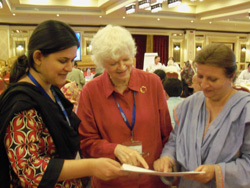Reunion in Islamabad
At Teachers College, faculty members often say that today’s students are tomorrow’s colleagues. But lately Frances Schoonmaker, Professor Emeritus, former Director of the Preservice Program in Elementary Education, has been experiencing the truth of that idea in a particularly rewarding way.
This past April, Schoonmaker, who retired from TC in Spring 2009, accepted an assignment in Islamabad with Preservice Teacher Education for Pakistan (Pre-STEP), a primary teacher education project in collaboration with USAID, the Academy for Educational Development (AED) and the Pakistani government. Pre-STEP provides support for implementation of a new government policy that will require all elementary school teachers to have a bachelors degree in education by 2018. Schoonmaker’s role has been to work with college and university faculty to design syllabi for the first-semester courses that are slated to begin this fall.
Such work is nothing new for Schoonmaker, who has taught and consulted in many countries, including China, where she was Visiting Professor at Nanjing Normal University, and Afghanistan, where she was a major contributor to the Teachers College/UNICEF teacher education initiative that ended in 2006. Still, one thing she’s learned over the years is that it’s never a bad idea to lean on people who know the terrain firsthand. So for her current assignment, she reached out to Hareem Atif Khan, who three years previous had taken her course on curriculum design. (Khan was also one of two student speakers at TC’s commencement ceremonies in 2009.)
“I knew Hareem was from Islamabad, so I wrote her for some cultural coaching when I learned I’d be here,” Schoonmaker writes in a recent email from her new assignment. “I’ve since been able to bring her into the project, and it’s been a treat to watch her at work. At one point we were teaching people how to develop rubrics for assessment, and I wanted to take a picture of Hareem in action. It was impossible. She seemed to be everywhere at once explaining, clarifying, summarizing.”
A decade ago, Khan taught in, and then supervised, a private school in Islamabad where students lacked age-appropriate books in their native language, Urdu. Determined to some day change that picture, she came to TC in on a Fulbright Fellowship and studied curriculum development and the teaching of reading and writing.
“One of the questions I remember asking Professor Schoonmaker after a class on student-centered curriculum design was, ‘What if no one has ever done this sort of thoughtful student-centered planning for an entire country’s national curriculum?’” Khan writes. “Now the two of us, along with faculty from Pakistan’s universities and colleges are participants in answering my question. Our goal is to plan for curricula across Pakistan that put the learner at the center.”
Khan says she is also drawing heavily on lessons learned from her apprenticeship with Lucy Calkins, Robinson Professor Children’s Literature, and the TC Reading and Writing Project:
“Since I’ve returned to Pakistan from TC, I’ve lived in Quetta, where the Internet has made it possible to continue helping design Reading Workshop Units of Study with Lucy and the Reading and Writing Project. I’ve also spent time helping design similar curriculum for public schools in Jordan.”
Of the Pre-STEP project she says, “We have unbelievably smart, hardworking people working in schools and colleges here who know all the pieces -- but to work on curricular framework that puts these pieces together is really the most exciting thing.” And there, too, she is benefiting from her years on West 120th Street. “At TC, one of the biggest things I learned was how one might link all of what we know -- all we’re doing -- and develop a real plan.”
Farooq Akbar, Pre-STEP Provincial Advisor for Baluchistan, says the project needs “more people like Hareem who really understand curriculum and teaching and can implement important principles in practical language that people here can understand”
Participants in the faculty workshop seem to agree.
“Before we got here we thought, ‘Just another workshop with foreign consultants telling us how to do things,’ says Rana Husain, Professor at Aga Khan University in Karachi. “But this one has been really helpful.” Husain says she likes the fact that Khan is working with her former TC professor. “Our students are like our children. We are very proud of them,”
Khan, the mother of a seven-year-old, can relate to that sentiment.
“Evenings belonged to the children in my own neighborhood,”
she reports. “I opened up my daughter’s supply of picture-books to the local
children and we’ve had roaring read-aloud sessions. The children have learned
print concept, story structures and some English, but I believe I have learned
the most.”
Published Thursday, Aug. 12, 2010

